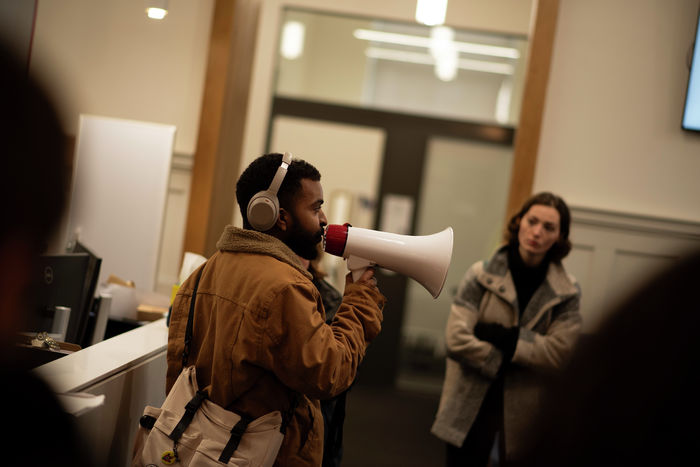How Cambridge bred eugenics
Lorelei Booth unravels the University’s historical relationship with eugenics

Nathan Cofnas is the spectre haunting Cambridge University discourse at the moment. Who is he? A self-described “race realist” and Vanguard of the “hereditarian revolution” against “wokeism”. In a moment of self-loathing, I subjected myself to reading his infamous blog posts which detail how Big Woke can only be brought down by exposing the Big Lie it is built upon: equality. Essentially, he claims that admitting there is an intelligence gap between the races is the only antidote to the disease of affirmative action and the corresponding epidemic of white children hating themselves.
Students are rightly horrified that someone who believes that genetics account for an IQ gap between black and white people has a place in this university. Concerningly, his role isn’t limited to research as he’s taught students in undergrad Philosophy supervisions. His acceptance into the University, and the later defence of his position after this controversy, is shameful to the Philosophy department and Cambridge as an institution. But within the grand scheme of the University’s history, his appointment is much less surprising. Eugenics and its rebrand as “race realism” have had a lengthy and passionate affair with Cambridge University. It is an entanglement that the University is notably reluctant to either acknowledge or take responsibility for.
“Unfortunately for the Cambridge University PR team, the Cambridge Eugenics Society records are star-studded with some of our most prominent alumni.”
The term “eugenics” (from the Greek for ‘well born’) was birthed here in Cambridge by Trinity’s own Francis Galton in 1883. Galton was inspired by his cousin Charles Darwin and adapted the idea of natural selection to presuppose that the survival of the fittest had been distorted by social welfare policies. He was the first to develop the statistical concept of correlation and applied it to his study of the heredity of human intelligence. Worried that his eugenic theories wouldn’t reach a wide enough audience through maths, he dabbled in utopian fiction with his novel Kantsaywhere, in which everyone attends a National Eugenics College. Anyone who performs badly in exams is then sent to labour camps and forbidden from reproducing. Yes, I said “utopian” fiction.
Then came his statistical heir and friend, Karl Pearson (King’s College), who further married the disciplines of statistics and eugenics. Pearson was a socialist – eugenics only really became associated with the far-right post-war – who believed it a fact that superior races would wage war against inferior races. He changed the field of statistics forever with the development of the biometrical approach, a methodology that uses statistical analysis to make sense of the heterogeneity of the human race. Unfortunately, rather than being used for good, Pearson used biometrics to call for “a homogenous white race” that should “dominate that of the black”.
Pearson was then succeeded as the Galton Professor of Eugenics by Ronald Fisher at Gonville & Caius. Fisher was also a statistician, and arguably “the single most important figure in 20th century statistics” at that. But alongside revolutionising modern statistical science forever, he also made the time to found the University of Cambridge Eugenics Society (and I can barely find the time to do my degree and still have a social life). Just 35 years ago, Gonville & Caius installed a commemorative stained-glass window for the “father of modern statistics”, an unrepentant racist. To put that into perspective, Caius thought that Fisher was a suitable person to celebrate immortally in their dining hall in the same year Honey, I Shrunk the Kids came out. It seems even eugenics were acceptable in the 80s.
Unfortunately for the Cambridge University PR team, the Cambridge Eugenics Society records are star-studded with some of our most prominent alumni. The opening page asks members to please send their £2.10 membership fee to a John Maynard Keynes at King’s College. Not satisfied with being only treasurer of the local branch, Keynes upgraded to director of the British Eugenics Society during the Second World War. Back in Cambridge, Charles Darwin’s son Horace was also on the committee, and the chancellor of the University was the patron of the society whose objective was to “promote the science of eugenics” with “particular reference to their bearing on racial and social problems”.
“Cofnas is a mere continuation of the Cambridge tradition rather than an anomalous disjuncture”
The only other university that could out-eugenics Cambridge is UCL. They made a public apology for their role in the history of eugenics in 2021, but only after it was discovered a secret eugenics conference had been running for at least three years on UCL grounds by one of their honorary senior lecturers as late as 2017. But on closer inspection of the guest list, Cambridge pops up again. A prominent attendee of these secret meetings was Toby Young (Trinity College) who had recently written an article advocating for embryo selection as a standard reproductive therapy to raise average intelligence by 15 IQ points every generation.
The unsung heroes of this tragic story are the students and staff who advocate against Cambridge’s endorsement of scientific racism. Whether it be the BLM protestors who forced Caius to remove Fisher’s window in 2020. The students who have signed the petition calling for Cofnas’s removal. Or the Sociology department staff who ground us on the right side of history by reminding us of the racist, imperialist and ableist past of the recurring villain in this story – IQ testing.
But nonetheless, this rogues gallery of Cambridge’s eugenics BNOCs highlights Cofnas as a mere continuation of the Cambridge tradition rather than an anomalous disjuncture. It is horrifying that Cofnas is right that it’s easier for him to be hired by the University of Cambridge than to have his “race realist” views published by the conservative-leaning National Review. This shouldn’t be the case. Both should be impossible. He is not a controversial defender of free speech, but a dangerous fearmonger appropriating scientific language to grant his branch of racism legitimacy. History has shown us Cambridge has a habit of allowing pseudo-scientific theories to back abhorrent racism. When will this finally end?
 News / Trinity exam burglar jailed for 11 months18 July 2025
News / Trinity exam burglar jailed for 11 months18 July 2025 News / Newnham students warned against using ‘secluded or concealed routes’ in evening after student followed16 July 2025
News / Newnham students warned against using ‘secluded or concealed routes’ in evening after student followed16 July 2025 Lifestyle / Seven species of Sidge17 July 2025
Lifestyle / Seven species of Sidge17 July 2025 News / Fenner’s cricket ground suffering ‘dismal decline,’ action group says 17 July 2025
News / Fenner’s cricket ground suffering ‘dismal decline,’ action group says 17 July 2025 Interviews / The Cambridge student hoping to become mayor of Baltimore: Thomas ‘TJ’ Jones16 July 2025
Interviews / The Cambridge student hoping to become mayor of Baltimore: Thomas ‘TJ’ Jones16 July 2025








